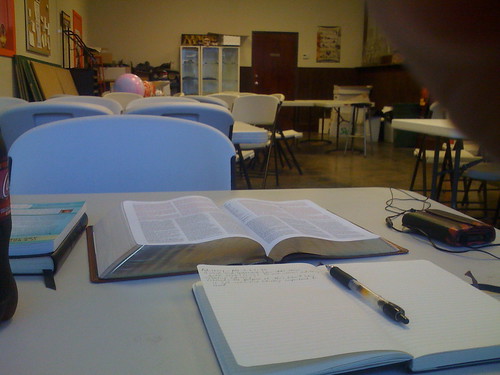I spent the first part of the week at Harding University teaching junior and senior high students at Uplift summer camp. This was my 6th year teaching a class and marked my 19th anniversary of attending Uplift. Yes. I am officially old!!!
Tuesday, my class focused on the Shield of Faith that Paul writes about in Ephesians 6:16. I told them that our Shield of Faith is indestructible if it is built on the foundation of the truth of who Jesus is. I encouraged them to read and study scripture and reliable resources that will help them find the truth of Jesus and who he really is.
I promised the students that I would post some apologetic resources here on the blog for them to look at. The books by Lee Strobel were books I read as a teen that were indispensable for me in strengthening my faith and showing me that Jesus Christ really is the Son of God.
It is ok to have questions about what you believe. It is ok to struggle with answers and to seek out help in strengthening your faith. It is my hope that these resources will be helpful to you as you seek the truth, face your doubts, and find security in Jesus!
The Case for Christ: A Journalist’s Personal Investigation of the Evidence for Jesus
The Case for Christ records Lee Strobel’s attempt to “determine if there’s credible evidence that Jesus of Nazareth really is the Son of God.” The book consists primarily of interviews between Strobel (a former legal editor at the Chicago Tribune) and biblical scholars such as Bruce Metzger. Each interview is based on a simple question, concerning historical evidence (for example, “Can the Biographies of Jesus Be Trusted?”), scientific evidence, (“Does Archaeology Confirm or Contradict Jesus’ Biographies?”), and “psychiatric evidence” (“Was Jesus Crazy When He Claimed to Be the Son of God?”). Together, these interviews compose a case brief defending Jesus’ divinity, and urging readers to reach a verdict of their own. (from the product description)
Case for Christ–Student Edition
Who Was Jesus? A good man? A lunatic? God? There’s little question that he actually lived. But miracles? Rising from the dead? Some of the stories you hear about him sound like just that–stories. A reasonable person would never believe them, let alone the claim that he’s the only way to God! But a reasonable person would also make sure that he or she understood the facts before jumping to conclusions. That’s why Lee Strobel–an award-winning legal journalist with a knack for asking tough questions–decided to investigate Jesus for himself. An atheist, Strobel felt certain his findings would bring Christianity’s claims about Jesus tumbling down like a house of cards. He was in for the surprise of his life. Join him as he retraces his journey from skepticism to faith. You’ll consult expert testimony as you sift through the truths that history, science, psychiatry, literature, and religion reveal. Like Strobel, you’ll be amazed at the evidence–how much there is, how strong it is, and what it says. The facts are in. What will your verdict be in The Case for Christ? (from the product description)
The Case for Faith: A Journalist Investigates the Toughest Objections to Christianity
Award-winning reporter and author Lee Strobel (The Case for Christ) once again uses his investigative skills to address the primary objections to Christianity. As a former atheist, Strobel understands the rational resistance to faith. He even names the eight most convincing arguments against Christian faith:
- If there’s a loving God, why does this pain-wracked world groan under so much suffering and evil?
- If the miracles of God contradict science, then how can any rational person believe that they’re true?
- If God is morally pure, how can he sanction the slaughter of innocent children as the Old Testament says he did?
- If God cares about the people he created, how could he consign so many of them to an eternity of torture in hell just because they didn’t believe the right things about him?
- If Jesus is the only way to heaven, then what about the millions of people who have never heard of him?
- If God really created the universe, why does the evidence of science compel so many to conclude that the unguided process of evolution accounts for life?
- If God is the ultimate overseer of the church, why has it been rife with hypocrisy and brutality throughout the ages?
- If I’m still plagued by doubts, then is it still possible to be a Christian?
These are mighty tough questions, and Strobel fields them well. Rather than write a weighty dissertation about the merits of faith, he brings us along on his quest as we meet leaders in the Christian community, such as Peter Kreeft and William Lane Craig. We also encounter his everyday friends and acquaintances that serendipitously fill in the holes in each of the eight arguments against faith. The use of dialogue from personal interviews and a scene-by-scene active narrative makes this an easy and engaging read. However, easy does not mean breezy. This is a book of substance and merit, one that will help Christians defend their faith, especially during the hardest of times, when they have to defend their faith to themselves in moments of doubt. (from Amazon review)
Also available as Case for Faith–Student Edition
The Case for a Creator: A Journalist Investigates Scientific Evidence That Points Toward God
Are Christianity and science incompatible? If there is a God, is he only an impersonal starter force? An introductory high school biology class first propelled Lee Strobel toward a life of atheism. God and science, he reasoned, were mutually exclusive. When the former legal editor of the Chicago Tribune converted to Christianity, he decided to investigate the science he had once accepted as truth. Did science point toward or away from God? As Strobel interviews a variety of scientists on everything from debunking evolutionary icons to the implications of the Big Bang to the existence of the human soul, he builds his case: scientific evidence points toward Intelligent Design.
Although the discussion often veers into the academic, Strobel works hard to make it accessible to those without scientific training. Throughout the book, he salts interview transcript information with interesting personal stories of his own spiritual and scientific quest for knowledge, as well as sometimes over-detailed descriptions of the actual interviews. Each chapter contains suggestions for further reading on particular issues of science and faith. (from Amazon review)
The Reason for God: Belief in an Age of Skepticism
Why does God allow suffering in the world? How could a loving God send people to hell? Why isn’t Christianity more inclusive? How can there be one true religion? Why have so many wars been fought in the name of God? Timothy Keller addresses the frequent doubts that skeptics and even ardent believers, have about religion. Using literature, philosophy, real-life conversations, and potent reasoning, Keller explains how the belief in God is, in fact, a sound and rational one. To true believers he offers a solid platform on which to stand their ground against the backlash to religion created by the Age of Skepticism. And to skeptics, atheists, and agnostics, he provides a challenging argument for pursuing the reason for God. (from the back cover)
Is the Bible True . . . Really?: A Dialogue on Skepticism, Evidence, and Truth
Did the Resurrection Happen . . . Really?: A Dialogue on Life, Death, and Hope
Who is Jesus . . . Really?: A Dialogue on God, Man, and Grace
With over 40 million books sold, bestselling author Josh McDowell is no stranger to creatively presenting biblical truth. Now, partnering with fellow apologist Dave Sterrett, Josh introduces a new series targeted at the intersection of story and truth. The Coffee House Chronicles are short, easily devoured novellas aimed at answering prevalent spiritual questions. Each book in the series tackles a long-contested question of the faith, and then answer these questions with truth through relationships and dialogue in each story.
In Is the Bible True, Really?: A Dialogue on Skepticism, Evidence, and Truth, we meet Nick, a college freshman at a state school in Texas. Nick has his spiritual world turned upside-down with what he hears in an introduction to religion class. His questions turn into conversations as he dialogues with professors, friends, and family about the authenticity and authority of the Bible. The other two books in the series: Who is Jesus, Really? and Did the Resurrection Happen, Really? continue the unfolding story at the college campus and the coffee house down the road. (from product description)
Is God Just a Human Invention? And Seventeen Other Questions Raised by the New Atheists
Atheism is making a comeback. From bookstores to bus campaigns, the question of God is up for public debate–and well-known atheists like Richard Dawkins and Christopher Hitchens are leading the charge. While these authors, who have been dubbed “The New Atheists,” argue against religion in general, they aim most of their criticisms and complaints at the world’s largest religion–Christianity. Why are people reading books that bash God and ridicule faith? And how can Christians respond? The writings of the New Atheists are especially challenging to the emerging generation who are skeptical of authority and have not been given answers to the hows and whys of faith’s honest questions. For these readers especially, authors Sean McDowell and Jonathan Morrow have penned an accessible yet rigorous look at the arguments of the New Atheists. Writing from a distinctively Christian perspective, McDowell and Morrow lay out the facts so that the emerging generation can make up their own mind after considering all the evidence. Divided into two parts–the first addressing the scientific and philosophical challenges to belief in God and the second dealing with the moral and biblical challenges–Is God Just a Human Invention? will respond to each major argument in a way that is balanced, thorough, and easy to understand. McDowell and Morrow believe that the current religious landscape is both an opportunity and a challenge for people of faith. Now is the time to respond. (from the publisher)
I’d love to hear from you what you think of these resources. Drop me a message in the comments or hit me up on Facebook or Twitter. I really hope that at least one of the resources will be helpful to you and your faith journey. My prayers are with you a you…
Seek the Truth.
Humble yourself.
Be Introspective.
Enlist help.
Listen.
Decide to stand!
peace,
Micheal




